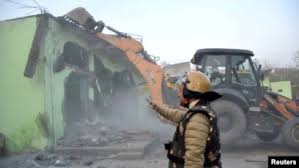Over 153,000 homes destroyed, 738,000 displaced
India's Muslims await Supreme Court ruling on ‘Bulldozer Justice’
 New Delhi: In a stark reminder of the human cost of India’s brutal “bulldozer justice,” a staggering 153,000 homes belonging to Muslims have been demolished and approximately 738,000 people displaced, mostly Muslims, in the past few years, according to an India-based rights body, the Housing and Land Rights Network.
New Delhi: In a stark reminder of the human cost of India’s brutal “bulldozer justice,” a staggering 153,000 homes belonging to Muslims have been demolished and approximately 738,000 people displaced, mostly Muslims, in the past few years, according to an India-based rights body, the Housing and Land Rights Network.
According to Kashmir Media Service, as the country’s Supreme Court prepares to hear petitions against punitive demolitions on October 1, rights advocates and affected communities hold onto hope for a permanent ban on this draconian practice.
The demolitions, often justified by authorities as targeting illegal constructions, have disproportionately targeted Muslim-owned properties, sparking allegations of collective punishment without due process. The Supreme Court has temporarily halted demolitions without its approval until the hearing.
Rights advocates argue that these actions amount to collective punishment without due process, violating fundamental justice principles. The practice has escalated under BJP-led governments, particularly in Uttar Pradesh, where demolitions followed protests against inflammatory remarks made by party spokespersons.
Meenakshi Ganguly, deputy director of the Asia Division of Human Rights Watch, condemned the practice, stating, “Indian authorities are using summary and abusive punishments against people, mostly Muslims, by demolishing their properties.”
Former Supreme Court Justice Madan Lokur echoed this sentiment, saying, “Residential houses are being demolished as a form of collective punishment without the sanction of law.”
The Supreme Court has observed that punitive demolitions cannot be justified, even if the property belongs to someone accused or convicted of a crime. The court noted that it does not oppose the demolition of unauthorized structures but emphasized that demolitions must follow proper procedures, including notice and legal remedies.
The practice of “bulldozer justice” has been widespread, with demolitions reported in states including Uttar Pradesh, Madhya Pradesh, Haryana, Assam, and Maharashtra, mostly under BJP rule. The affected communities await the Supreme Court’s ruling, hoping for an end to this destructive practice.
Housing and Land Rights Network (HLRN) is an Indian organization that works mainly on the human rights to adequate housing and land.








